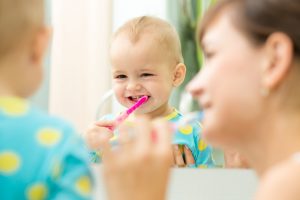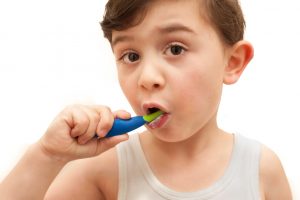 Teaching your children good oral hygiene is one of the best gifts you can give them! If you lead by example with regular brushing and flossing, your children will more naturally follow.
Teaching your children good oral hygiene is one of the best gifts you can give them! If you lead by example with regular brushing and flossing, your children will more naturally follow.
What can you do to make brushing a fun experience? Here are a few simple tips:
- Brush along with your child
- Brush along with music
- Select a toothbrush and toothpaste with animals or cartoon characters
Teaching good oral hygiene in your child’s formative years will go far in preventing issues such as tooth decay and tooth loss. These problems can be painful and lead to other issues such as difficulties speaking and eating.
It’s never too early to start teaching your child about good oral hygiene!
Infant Dental Care
Did you know that babies can develop a form of tooth decay? This is most common when infants are allowed to go to sleep with a bottle filled with milk (including breast milk), formula or juice. These liquids all contain sugars that produce bacteria in your child’s mouth that attack tooth enamel. Rather than a bottle, perhaps try using a pacifier for bedtime soothing. Do note, however, that the use of pacifiers or thumb sucking should be gently discouraged by the age of 3 in order to prevent future orthodontic problems.
Cavity prevention can be started before your baby’s first teeth even appear! After meal time, you can use a damp washcloth to wipe your baby’s gums to prevent the buildup of bacteria. When your child’s first teeth appear, you should begin gently brushing their teeth at least once per day (before bedtime) with a small, soft-bristled toothbrush and a tiny bit of fluoride toothpaste.
It is best to schedule your child’s first dental appointment by 1 year of age. At this appointment, we will help demonstrate effective brushing techniques and check for early signs of dental decay.
Childhood Dental Care
 By 3 years of age, you can teach your child the following dental care routine:
By 3 years of age, you can teach your child the following dental care routine:
- How to brush their teeth: Many children will need assistance with this until the age of 6 at which time they will have developed the motor skills and knowledge to effectively brush on their own. Children should use a soft-bristle brush and no more than a pea-size drop of fluoride toothpaste which helps to strengthen and harden their teeth. Observe your child carefully to ensure they do not swallow or eat toothpaste.
- Daily flossing: Flossing is essential for removing plaque that forms between your child’s teeth and below their gumlines. If this plaque is not removed regularly, it will turn into tartar which can only be removed with professional dental cleaning.
- Regular dental visits: Professional dental exams and cleanings are recommended twice per year. At these semi-annual appointments, we will also apply topical fluoride which will make your child’s teeth more resistant to decay.
- The benefits of a balanced and healthy diet: Limiting sugar filled snacks and soda will reduce the potential for cavities. If sweets are allowed, they are best to be eaten at mealtimes as in between meal snacking is more likely to lead to plaque and tartar buildup.
Teen Dental Care
As you well know, teenagers are rather independent! By this age, they are primarily responsible for their own dental health. However, you can still provide loving guidance, helping them to make wise choices to maintain good oral health. Teaching them early about the dangers that come with tobacco and alcohol abuse can stave off many potential issues. Encourage them to drink plenty of water while avoiding highly acidic/sugar filled soda and sports/energy drinks. Ensure they continue with regular, semi-annual dental visits for professional cleanings and exams. If the dentist detects any issues with your teenager’s bite, orthodontics may be recommended to prevent more serious future dental issues.
Your success in teaching your child about these valuable dental habits will help ensure they have strong healthy teeth for many years to come!
Schedule an Appointment
